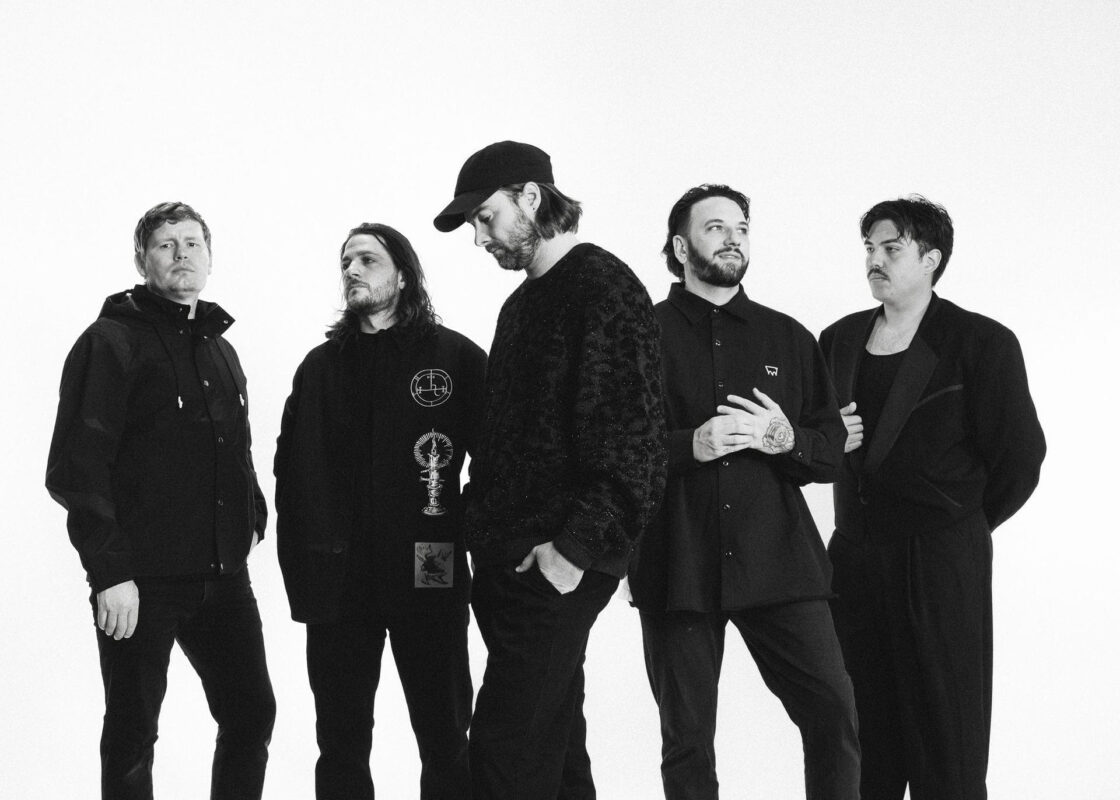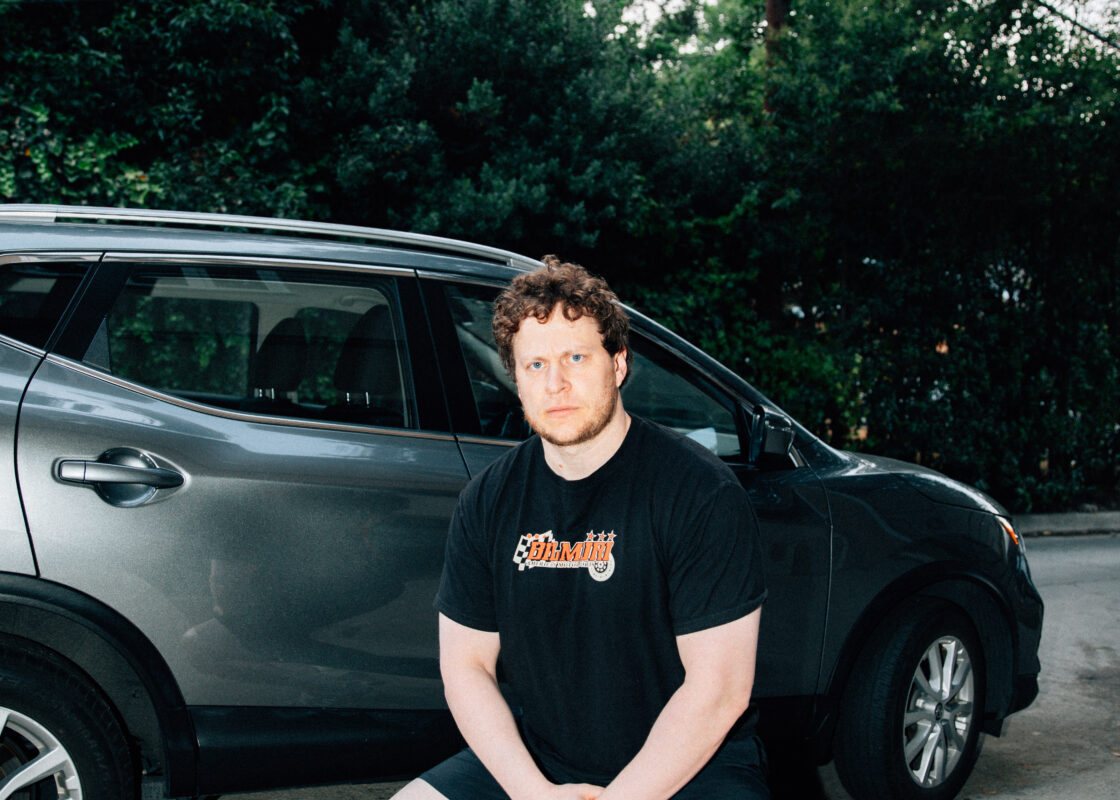SPECIAL OFFER FOR HM READERS
HM has partnered with Arkon Apparel, Akissforjersey’s clothing sponsor, to give you a discount on any item in their entire store just for being a reader!
Just use the code NEWBODIES at the checkout to redeem 15% off anything!
[button url=”http://arkonapparelco.com/” target=”blank” style=”flat” background=”#7d3a3b” size=”6″]Get to shopping![/button]There’s nothing I love more than a real, down-to-earth band, and Akissforjersey is exactly that: unflinchingly who they are, no compromise. The members hung up the music life back in 2008 after the group’s second record, Victims, was released, but some time in the summer of 2013, the itch came back. As musicians, they couldn’t ignore the persistent call of their original dream. They made the commitment to get it back together, signed a new deal with InVogue Records and now the band is gearing up to release its third full-length record, New Bodies, this month. I found it interesting they decided to commit to a label while most bands seem to be committing to D.I.Y. We talk about this and more here, as I speak with vocalist Zach Dawson, bassist Parker Williams and guitarist Tyler Lucas.
HM: You’re in the studio. Are you working on the new record?
Dawson: Yeah, we are. It’s called New Bodies and it’s set to release Jan. 21, 2014. So it’s coming pretty soon. We’re pretty stoked for it. Basically, we’re knocking out like the last bit of vocals on the album. And we’re kind of just putting the final touch on that. You know some like screams and echoes too, overdubs, different crazy stuff like that.
To be honest, I haven’t been able to listen to you guys a whole lot. I’ve known about Akissforjersey for a long time, but when was your last record?
Williams: It was in 2008. It was called Victims on Tragic Hero Records. We’re with InVogue Records now.
With so many bands doing the indie, D.I.Y. thing now, what prompted you to stick with a label?
Dawson: Well, after Victims, we weren’t sure what we were going to do, if we were going to stay together or end the band, go on hiatus or what. … More recently, here in the last six months, Nick Moore — who’s the owner and CEO of InVogue Records, he used to tour with Before Their Eyes, and we toured with them a whole lot — connected with us, stayed in touch, and it was a thing where he asked us one day, “When are you going to put out that new Akissforjersey album?”
We loved the change of pace and we took some ideas, and he said he’d help us support this album. It’s just a matter of finding the right people with the right attitude, the right person to go to who can help our band get to where we want it to be and get everything out there.
So what about this album? I know you used to go for more of a hardcore sound. Has there been a bit of a sound change?
Lucas: To sum it up in one statement, it is different because there are heavier heavys, catchier catchys and prettier prettys. Basically, we wanted to stay true to who we always have been, and we got the chance to work with one of our best friends, Sid Menon, on production. He’s a genius, and I think he really helped us develop our ideas for this record and really stay true to who we are.
I think you’ll be able to hear the maturity with this album. We really wanted to structure this album compared to other records. We wanted to focus on the choruses as to where they just explode and they really catch the listener’s attention so well, and I think we really achieve that in this album. I think this album is a bigger statement as a whole album than the past two albums we’ve had.
Dawson: For me as the vocalist, the high-register singing has always been prevalent in the music scene; I’m at the point where I’ve got more years on me now, and (I believe) the maturity of the band shows on this record.
As a listener of music, I always gravitate towards third records, simply because there’s a new sense of completion each time. With the debut, you’ve set a standard, and with the second, bands usually experiment. What stands out to you with this being your third record?
Dawson: I think the maturity is through and through. It’s a reminiscent sound of what we had in Victims, but it’s more mature. I feel like for us, our first album was very experimental and our second album was much more, for lack of a better word, generic. A little closer to what everyone else was playing, it fit the mold. With this one, it’s definitely a culmination of the two. We found the sound we’ve been looking for this whole time.
Talk to me about the hiatus time. What prompted the band to really come back and keep going?
Dawson: I think that it was – ever since we decided to hang it up in 2008, after Victims came out – there’s always been a very strong desire for everyone in the band to return to play music. It’s one of those things – obviously in music – where it’s hard to leave it alone (if you’re a) musician. It’s not that you just quit. With all the crazy stuff that has happened to us – like our van blew up and other things were happening, like I was getting into a point in my life where I was hoping to get married – I don’t think it was necessarily desiring to not put out another album. I think it was, more or less, to say it needed to be the right time. We’ve had a couple of new members since then. We needed the right people and the right resources to be able to pull it off.
Also, the biggest thing were the finances, because … It was always like we had a few songs written, we were given a way to sign a contract – then it’s like, “We lost a member.” There were still these few songs we’d written and then we didn’t have the funds because the contract fell through. It turned into, like, two years. If not for the fans, they (were the ones that) kept on saying, “We want this!”
We did update videos and things of that nature, and we really tried to keep that on course. It’s not like we weren’t practicing or anything; it just came to God’s will at the right time, and to actually do what we’re supposed to do.
Has this record been in the can, or have you been working on it for like three years or so, or has it been relatively new?
Dawson: Actually, I think only the ideas were there. The songs themselves we started writing them about August. But actually, there is one song on this record that we had every since we tried to start again, and that was actually, probably about 2009, 2010. It’s called “War,” and that’s the first single off this new album.
So tell me about the songwriting process, and the recording process. Was this time different for you?
Dawson: Honestly, we’d just be sitting around with some other music on at low volume and someone would bring an idea to the table, like a riff. And another guy would say, hey I like that, what if we did this? And someone else will say, we could change it this way, and we just see what we can develop into a song. It’s basically everyone bringing in separate pieces, and we figure out what works and what doesn’t. We would actually work on rhythms first because you really don’t know the lead yet. It really just compliments the vocals, and when you heard this new album, the leads sit down in the mix. That’s really different from our last albums because it would bleed more or something wouldn’t be done properly, so on this album the vocals really pop out at you because they sit down in the mix. Everything meshes really well. The best part about all of it is that we’re all only about 30 minutes apart at the most, so we can get together and work on the tracks, rather than some bands that are all spread out over the country and have to send tracks back and forth. I feel like that would be hard to do because so much for us comes from the songwriting process, with mentally connecting with other people, who are right in front of you in the studio.
Since you’re all pretty much from North Carolina, do you think that area had anything to do with your musical influence?
Dawson: I’d say so, it was actually kind of weird, we had this small pocket of fans from this area that got pretty big, so we had a lot of influence from that. There were other bands from this area, like Between the Buried and Me, they’re from here and so was Beloved. Also Spencer Chamberlin (formerly of Underoath) is also from this part of town, so I think a lot of those talented individuals from this weird little pocket of North Carolina really helped shape us and shape our musicianship.
Our whole mission is being there for all these people that supported us.
Have you worked much with any of the bands from that area?
Dawson: Well, Sid (our producer) actually played bass for Glass Casket, which was one of the bands from this area. And he started working with us when we were on Tragic Hero, and just the way he’s influenced us in that way, we’ve had such a great relationship with him, and it really comes through on this record.
What is your mission as a band?
Dawson: I think ever since really the beginning of the band, our whole mission is being there for all these people that supported us. We want to make friends with people. I mean the only reason we’re able to play music is because people actually want to hear it, and to think that people can support your band even through all of the ups and downs that we’ve had completely amazes me and that’s so awesome. Obviously we have a pretty strong spiritual message as well, and if we can give anybody some hope or anything positive from our music if possible you know, we get into the spiritual direction, and be there for them, if they need anything. We’ll allow them to talk about some hard times they’re having, that’s basically the core of who we are and that’s basically the reason that we’re doing this. Actually what I’ve always found amazing for me; we’re all very, very active on the Facebook page of the entire band as well. We all check it throughout the day but you know, someone might send us a message, and one of us replies and it’s always been amazing to me how many bands don’t reply, how many bands ignore their fans, how many bands feel like they’re above their fans. If we don’t have our fans, no one will listen to the music. I think that’s important.
Lucas: Just to elaborate, I think this generation as whole, it seems like there’s more animosity towards one another. We can see it when we’re at a show, day to day at the workplace, wherever. You really have two sides of the generation going against each other. So what we really hope is that people get hope and love out of our music, and bringing a generation back together. I think if we model ourselves as Christ’s love, nothing can be stronger than that.
Where did your band name come from? I thought maybe one or more of you were from New Jersey, or knew a girl named Jersey.
Williams: It’s actually the absolute worst story for a band name you will ever hear in your life.
Lucas: Can we make one up? Like, we knew the Ambassador of New Jersey? Like, he kissed Tyler on the cheek and that’s where it came from?
Dawson: Okay. The real story is that it’s funny how a band name sticks. We were trying to think of a name, and our guitarist (at the beginning) brought up AkissforJersey, and we’re like, what? But okay, that’s cool. Put it on the back burner. I think it was somebody’s screen name or someone mentioned it in an I.M. somewhere. But we used the band name when we played out, and we said we’re just keeping it for now since we’re not really doing anything yet, we’ll do a few shows and figure something out. Well a couple of years later and nothing changed, so it had to stick. We should have made something up. It’s not exciting but it’s true.
If you could change something about the music industry, what would it be?
Williams: Well, Justin Bieber is retiring so I guess my wish came true.
Dawson: For me, honestly, I wish it would be like old days. And when I say that, I mean, North Carolina has such a good music scene, and when you play a show it’s like everybody would come out and have fun and that was that. It goes back to the generational thing.
Kids now, they don’t want to come out to the show, they don’t want to have fun, they don’t want to support local music and the music seems to be dying in some places. … It’s not even about the industry; it’s more about the kids and their thought process, getting them to embrace it more. Getting them off all the pop stuff like Lady Gaga and whatever and getting them to a real music show where they’ll have fun.
Lucas: When you say that, it makes me think – with mainstream and Top-40 music – it’s hard to find any depth to any songs. It’s people throwing songs together that don’t really mean anything, and it’s an unfortunate state of being.
Post-hardcore, hardcore music, since it’s beginning, it’s being created to say something and to mean something in life. It’s so passionate. The mentality I see with a lot of bands coming up is that, I’m just going to put something out with dubstep or techno beats, and I’m not going to say anything meaningful on stage. This whole genre of music is leaning towards meaningless music. I want to see bands with so much passion, an industry that thrives on that instead of what some people might think is just the almighty dollar.
Williams: In an industry such as the one we are in today, you can have someone like Kanye West comparing himself being on stage to the work of a police officer or military person. And they don’t even really make music. It’s more of making someone into a figure, and it’s frustrating. Even dating back to Bob Dylan and the ’50s and ’60s, music had a purpose and a meaning. Is what they’re making today, music? Yeah, but it’s just expressionless music. Like for Kanye. While it might be amazing, how much of it did he actually do? These guys have a huge team around them and they pass around songs and content so fluidly.
















